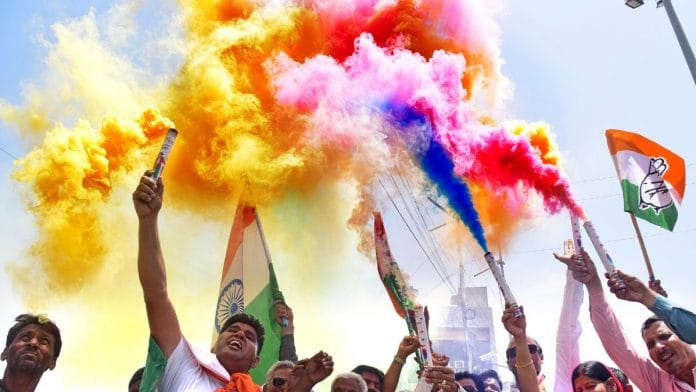The Congress has ample reason to celebrate its resounding victory in the 2023 Karnataka assembly election. The party’s win marks a notable power shift in a state once held firmly by the Bharatiya Janata Party, which could secure only 65 out of 224 seats as opposed to the Congress’ 135.
While this triumph could be a potential springboard for the Congress’ resurgence in national politics, it must reflect on the valuable lessons from this election, and so should other stakeholders.
Protect voters from fear-mongering
The first – and most crucial – lesson is that the term ‘fascism’ is often used by Communists and Islamists to exploit the very democracy that even gives them the right to call a democratically elected government as ‘illegal’. It is important to keep educating India’s aspirational youth against any propaganda that would make them feel helpless in a land of opportunities or obstruct them in choosing their representatives — from municipality to national level. Political leaders must strive to place before them the facts of democracy and shield them from fear-mongering. Any political party can win in a democracy. It is this principle that has rewarded Congress and taught BJP a lesson in the Karnataka elections. Democracy in India is a fact, just like Pakistan Army owning Pakistan is. Don’t let anyone tell you otherwise.
Also read:
Local issues take precedence
Next, both parties must realise the significance of selecting strong candidates who prioritise local issues, as this greatly affects election outcomes. While the BJP’s “double engine government” pitch failed in Karnataka, the party continues to dominate Uttar Pradesh and Assam due to its strong local leaders. This is a testament to the fact that assembly elections cannot be won solely in the name of Modi. Local issues trump national political considerations in assembly polls, and parties must give them the importance they deserve.
Similarly, Congress has long made the mistake of attributing every achievement to the Gandhi family, limiting its own appeal. However, it adopted a different approach in Karnataka by acknowledging state-level concerns. Congress, for instance, pounced on Amul after the dairy co-operative announced its plans to sell products on e-commerce platforms in the state. The party alleged that this move was a conscious effort by the central government to undermine the state’s locally established cooperative-based milk brand, Nandini. Congress successfully captured the local sentiment by highlighting the potential risks that Amul’s entry would pose to Karnataka’s dairy industry, which supports over 25 lakh farmers.
Also read:
Appeasement, controversy won’t yield results
The strategy of appeasement and generating controversy has limitations and doesn’t deliver desired outcomes after a point. BJP’s attempt to play on the reservation matrix by removing OBC quota for Muslims and shifting them to the EWS category while simultaneously increasing reservation for Lingayat and Vokkaliga communities did not help its case. Not only was this move unfair to Pasmanda Muslims, but it also failed to consolidate the Lingayats and Vokkaligas into a BJP vote bank. In constituencies dominated by the Lingayat community, Congress secured 44 seats, whereas BJP managed to win only 20.
A nationwide debate ensued after Congress vowed to ban outfits like Bajrang Dal in its election manifesto – a development that caught the attention of key BJP leaders, including PM Modi. Later, DK Shivakumar, now the deputy CM, turned the tables in Congress’ favour by saying his party would build Hanuman temples throughout the state.
Also read:
Corruption plays a decisive role
Corruption undeniably played a crucial role in shaping the outcome of the incumbent government. Congress made corruption its central focus in the Karnataka election campaign by skillfully labelling BJP as a “40 per cent commission” government. The results of this campaign and the election show that corruption is indeed a major issue in Karnataka. In fact, throughout India’s political history, corruption has often played a decisive role in determining the fate of ruling governments. Notable instances, such as those involving former prime ministers VP Singh and Manmohan Singh, serve as examples of how corruption can profoundly influence the trajectory of incumbent administrations.
Amana Begam Ansari is a columnist, writer, TV News Panelist. She also runs a weekly Youtube show called ‘India this Week by Amana and Khalid’. Views are personal.
(Edited by Zoya Bhatti)






